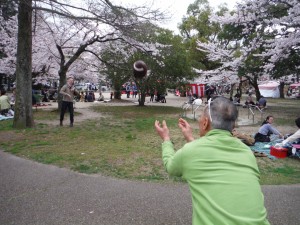 As an English language coach, I am responsible not only for teaching the elements of the English language, but also the culture which is included with every language. In the case of English, this covers a huge range of cultures, from Europe to America to Australia and more. For example, when a student asks me why the Rolling Stones sing “I can’t get no satisfaction” instead of “I can’t get any satisfaction”, I have to explain the difference in British dialects and how the north and south of England are vastly different places, with different culture, which affects language. A student may also ask why we don’t have an English equivalent for the Japanese expression “having a cat’s tongue”. This expression refers to people who are sensitive to eating really hot food, i.e. people with sensitive tongues, like cats have. Here again, I have the task of explaining differences in food culture. Japanese cuisine includes a lot of cooking at the table, eating directly from the fire, hot and fresh food. Western cuisine is usually served in the kitchen and carried to the table, before being eaten. This means that even the hottest western food is somewhat cooled off by the time it reaches our mouths, whereas many Japanese dishes are eaten steaming hot. this has resulted in the above expression being prevalent in Japan, but not in the west.
As an English language coach, I am responsible not only for teaching the elements of the English language, but also the culture which is included with every language. In the case of English, this covers a huge range of cultures, from Europe to America to Australia and more. For example, when a student asks me why the Rolling Stones sing “I can’t get no satisfaction” instead of “I can’t get any satisfaction”, I have to explain the difference in British dialects and how the north and south of England are vastly different places, with different culture, which affects language. A student may also ask why we don’t have an English equivalent for the Japanese expression “having a cat’s tongue”. This expression refers to people who are sensitive to eating really hot food, i.e. people with sensitive tongues, like cats have. Here again, I have the task of explaining differences in food culture. Japanese cuisine includes a lot of cooking at the table, eating directly from the fire, hot and fresh food. Western cuisine is usually served in the kitchen and carried to the table, before being eaten. This means that even the hottest western food is somewhat cooled off by the time it reaches our mouths, whereas many Japanese dishes are eaten steaming hot. this has resulted in the above expression being prevalent in Japan, but not in the west.
This is an aspect of working at Smith’s School of English that I really love. Not only am I given the time and opportunity to teach such cultural background, but I am encouraged to do so. Many of the lessons in Smith’s English curriculum include cultural notes and background and students are always encouraged to ask questions. At Smith’s school of English Otsu we have had teachers from many different places, including Canada, the USA, Australia, India and the UK. Each teacher brings with them a different cultural background and this culture is directly tied to the English they use. At this year’s Smith’s School of English Otsu Annual Hanami Party we had 3 American quests, 1 of whom brought an American football. This was such a catalyst for discussion and many of the party-goers had never seen a real American football before and were very interested in it. The culture and the language that accompany it make for truly exciting and enjoyable lessons for both teacher and student. Did you know that in Inuit language, there are over 100 ways of describing “snow”, but no word for “watermelon”? Do you know why we ask “How ya doin’?” in America but “How ya goin’?” in Australia? Why not ask your teacher next lesson!
Leave a Reply